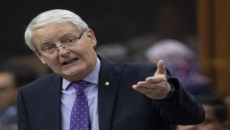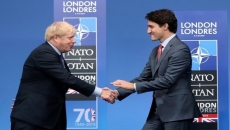The Canadian Armed Forces is reporting minimal progress in its drive to increase the number of women in uniform over the past five years — a task experts say has been made even harder following recent allegations of sexual misconduct in the ranks.
Then-defence chief general Jonathan Vance in February 2016 set a goal of having women represent one-quarter of the Canadian Armed Forces' members over the next decade. At the time, women accounted for 15 per cent of military personnel.
The directive was part of a broader push to have the military better reflect Canadian society and coincided with efforts to eradicate sexual misconduct in the Forces, which had only recently been flagged as a significant problem in the ranks.
Yet new figures provided by the military show women represented only 16.3 per cent of all uniformed members this month, an increase of just 1.3 per cent over the past five years.
While experts were divided Wednesday over the importance of the specific target, several agreed that the military has virtually no chance of hitting the 25 per cent mark by 2026, particularly following recent reports on its failure to deal with inappropriate and criminal sexual behaviour.
"There is no doubt that the goal of 25 per cent women in the military by 2026 will not be achieved," said Maya Eichler, an expert on military sexual misconduct at Mount Saint Vincent University in Halifax.
"This goal may not have been achievable before the current sexual misconduct crisis, but it has no doubt been further hampered by the slow progress we have seen in addressing sexual misconduct."
Eichler is one of those who is concerned about putting too much focus on the numbers, with the idea that simply adding more women without failing to address the many systemic and institutional barriers and challenges inside the military will not work.
"Adding more women and diverse members 'and stirring' doesn't in and of itself change the culture if that culture continues to define the 'ideal' soldier as male, white, and heterosexual," she said.
"If you continue to put more women into a system that was not built with them in mind, you continue to create potential harm. I actually think it's unethical to focus on increasing the recruitment of women before we have addressed systemic biases and barriers."
Senior military officers have previously suggested that women need to represent 30 per cent of all uniformed members to bring about real culture change, which Canadian Forces College professor Andrea Lane said has been shown in previous studies.
Yet Lane and others including Canadian Global Affairs Institute fellow Charlotte Duval-Lantoine suggest the military's culture needs to change in order to not only attract, but also retain, more women in uniform.
"You need more diverse people to institute the culture change, and you need the culture change in order to make the CAF attractive to women," Lane said. "It really is a chicken and egg."
In practical terms, Duval-Lantoine points to ongoing concerns that changing fitness standards to accommodate the physiological differences between men and women represents an unfair lowering of the standard rather than addressing an inequality.
"I do not agree that the slow progress in women's representation in the CAF is the reason why culture change is being stifled," she said. "Fears and anxieties over 'preferential treatment' prevent the equitable differential treatment necessary to improve women's recruitment."
Changing the military's culture has become a top priority after allegations that members of the top brass have been guilty of inappropriate sexual behaviour prompted widespread anger and frustration, along with a number of victims coming forward to publicly tell their stories.
One of the Canadian Armed Forces' top female officers, Lt.-Gen. Jennie Carignan, has since been tapped to lead efforts to change the culture while retired Supreme Court justice Louise Arbour is conducting a review of the problem of sexual misconduct and come up with solutions.
Their appointments come as the military continues dealing with the fallout from allegations against some of its top commanders, including Vice-Admiral Haydn Edmundson, who is currently being investigated by the Canadian Forces National Investigation Service.
Maj.-Gen. Steve Whelan officially took over on Wednesday as the new officer responsible for human resources in the military, the position that Edmundson held before he was put on leave pending the results of the investigation. Edmundson has not responded to requests for comment.
Digging deeper into the numbers, the Canadian Army currently boasts the smallest percentage of women in uniform at 13.8 per cent. That compares to around 20 per cent for the Royal Canadian Navy and Royal Canadian Air Force.
The military has also seen limited progress increasing the percentage of service members who are Indigenous over the past five years, with the current number about 2.8 per cent against a target of 3.5 per cent.
There was better success in adding other people of colour, who currently represent 9.6 per cent of all service members compared to 6.2 per cent in summer 2015. The military’s target is 11.8 per cent.
Military commanders have previously emphasized the importance of diversifying the force to better reflect Canadian society, address sexual and hateful misconduct, increase its pool of potential recruits, and better operate overseas where troops may interact with local populations.<






